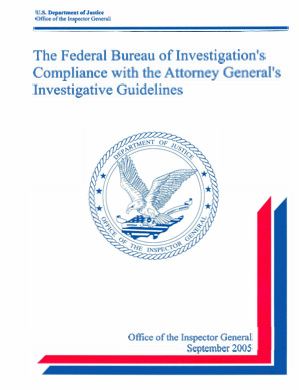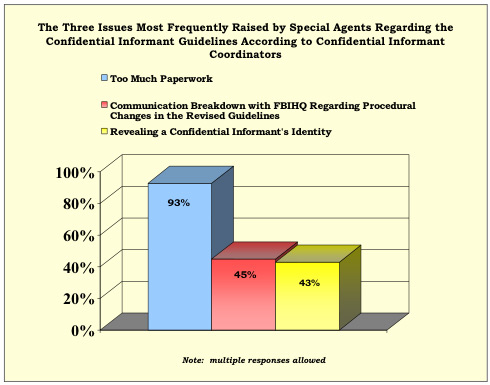Report: FBI routinely ignores informant rules
Agents in Luna's last case violated FBI guidelines
October 17 , 2005 -- The U.S. Justice Department's Office of Inspector General says FBI agents routinely break the bureau's own rules governing the handling confidential informants.
Inspector General Glenn A. Fine reviewed 120 federal cases, and found that FBI agents violated department informant rules in 104 of the cases, or 87% of the time. The findings are contained in a 302-page report released in September 2005 by the Inspector General. (Click here to download the full report in PDF format [2,700k].)
Rogue informants, or rogue agents? The Justice Department's watchdog says that FBI agents routinely ignore department rules in the handling of their informants. (Click here to download the full report in PDF format [2,700k].)
Slain federal prosecutor Jonathan Luna was immersed in the problems created by just such a rogue-informant case the night he mysteriously vanished from the federal courthouse in downtown Baltimore, Maryland, on December 3, 2003.
Luna spent the last hours of his life covering up the misadventures of the Baltimore FBI field office's "Safe Street Task Force," and the bureau's carte blanche handling of paid FBI informant and heroin dealer Warren Grace.
In the days leading up to Luna's death, defense attorneys discovered that informant Grace had escaped home confinement, and was accused of shooting up his neighborhood and dealing heroin. Heroin was also found in Grace's vehicle.
Defense attorneys complained that Luna attempted to cover up the Baltimore FBI scandal by not properly disclosing information to defense lawyers in the case. The day before Luna's gruesome murder, a federal judge had ordered an investigation into the handling of Luna's FBI informant. The night of his death, Luna repeatedly expressed doubts about the legality of a plea agreement designed to protect the FBI and the Justice Department from investigation in the matter. Luna never completed the plea deal before his death.
But Luna himself may not have been given proper notice by the FBI of the informant's misbehavior.
Page 108 of the Inspector General's report states, "The FBI is required to notify either a U.S. Attorney or the head of a DOJ litigating component when a CI (confidential informant) engages in illegal activity which was not previously authorized, known as unauthorized illegal activity or 'UIA.' The Confidential Informant Guidelines require that notice of the unauthorized illegal activity be provided by the Special Agent in Charge of the field office operating the CI to the U.S. Attorney or DOJ component head, not by subordinate FBI field office personnel to other U.S. Attorneys' Offices or DOJ personnel....
"Of the 120 informant files we examined during our review, we identified 12 instances, or 10 percent, where the CI engaged in unauthorized illegal activity.
"Under the Guidelines, the FBI was not required to notify the U.S. Attorney in 3 of the 12 cases.
"In 4 of the 12 cases, the CI case files did not include sufficient information for us to determine ... whether the Guidelines' notification requirement was triggered....We identified one field office that did not have any forms to record the occurrence of unauthorized illegal activity. The remaining five cases required notification to the U.S. Attorney's Office. In two of the five cases, the FBI failed to provide any notification to the U.S. Attorney's Office, in violation of the CI Guidelines. The UIA in these cases were a state arrest relating to purchasing heroin and a misdemeanor charge of manufacturing unauthorized records."
In court transcripts recorded in the days before his death, Luna made no mention of having received a Unauthorized Illegal Activities report from Warren Grace's FBI handlers. The Baltimore FBI field office, the Inspector General's report notes, had a 29% "non-compliance rate."
FBI rules for the handling of confidential informants are routinely broken by FBI agents, says the Inspector General's report. Agents routinely do not tell prosecutors when informants commit crimes that are not authorized by their FBI handlers, Fine's report states.
The informant guidelines were revised following FBI abuses in the 1990s. The report notes, as the chart below indicates, that FBI Director Robert Mueller said that many agents find the reporting paperwork cumbersome.



